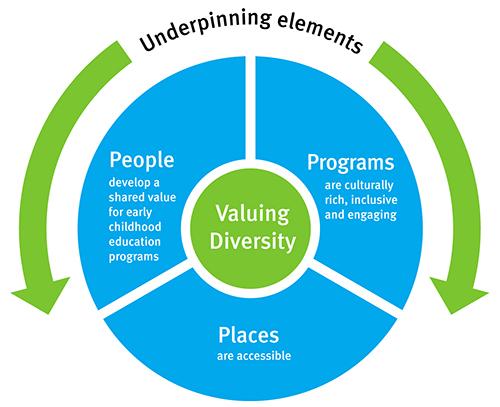26 5.5: The Role of Diversity in Early Childhood Programs across the Globe
Being culturally responsive and equity-minded in early childhood education is important to programs across the globe. Here are some examples of the role diversity plays in early childhood education from Australia and New Zealand.
From Australia
Queensland children come from diverse ethnic and cultural backgrounds, participate in a variety of social, cultural and religious belief systems, and have different knowledge, skills, abilities and needs. They live in different places: in urban, rural or remote areas.
The vision is for communities, children and families to experience welcoming, inclusive and culturally rich early education programs where all children, regardless of their differences, are engaged in learning.
Approach
To fulfil this vision, a holistic approach is needed that considers the challenges Queensland families face in accessing and participating in early childhood programs. This approach comprises three key elements: People, Programs and Places.

People
The first step involves people developing a shared value for early childhood education.
Embracing the benefits of early childhood education and the associated positive impacts on a child’s future development, learning, health and wellbeing is fundamental to developing this shared value.
Early years and family-centered services promote these benefits and make connections between families and local service providers.
Programs
Programs should be culturally rich, inclusive and engaging, and make families feel welcome.
Importantly, when families reach the door of a service, a welcoming, safe and inclusive program and environment encourages them to stay and become engaged in their children’s learning.
Places
Places must then be accessible. Ease of access to early childhood education programs for families is critical. This means ensuring:
- sufficient places are available for all children
- there is flexibility in the models and settings of programs
- programs are affordable for all families
- support is provided in navigating enrollment procedures and managing transitions across a range of services.
Guiding principles
Five principles guide the approach to valuing diversity in early childhood education:
- Engagement that supports the development of positive and respectful relationships, building trust and achieving genuine community connectedness among families, educators and broader communities.
- Integration that efficiently utilizes existing early childhood development initiatives and resources and supports successful educational transitions.
- Targeted approaches in areas of identified need that use a range of strategies to allow for the needs of individual communities.
- Early intervention that recognizes the importance of early childhood development and investment in young families and children younger than school and kindergarten age.
- Improvement and accountability of initiatives by incorporating appropriate performance monitoring and review. [60]
New Zealand’s Te Whariki Curriculum
New Zealand’s curriculum for early childhood education, Te Whariki, is founded upon a socio-cultural process of teaching and learning. One of the major aspects of this system of education is consideration for the “aspirations of the children” (Schurr, 2009, p. 4). This implies that the education given to children must be able to equip them with the competence and confidence that they require to develop a sense of belonging and contribute positively to their society. Te Whariki in New Zealand is thus described as “assessment for learning” which is learner based and intended for documentation of everything that the young children have learnt.
There are several benefits of this socio-cultural form of assessment.
- Whakamana: empowerment that protects the identity of young children as competent and self-assured learners
- Kotahitanga: children are considered holistically and their entire developmental process is considered
- Whanau Tangata: involving the children’s family and community members in the education process
- Nga Honoga: taking into consideration the different associations that young children form with others in their social and cultural surroundings
Socio-cultural assessment enables educators to comprehend the manner in which children react when confronted with challenges or transformations in their surroundings. According to Gibbs and Teti (1990, p. 77) socio-cultural perspective of learning and assessment is very advantageous due to the fact that it enhances the social associations that young children have with others that are more informed; this enables the young children to increase their knowledge. Socio-cultural assessment is also very important in the Te Whariki educational system of New Zealand due to the fact that it enhances the identification of cultural identities and diversity and allows the assessors and children alike to gain insight into their own cultures and those of other. [61]

